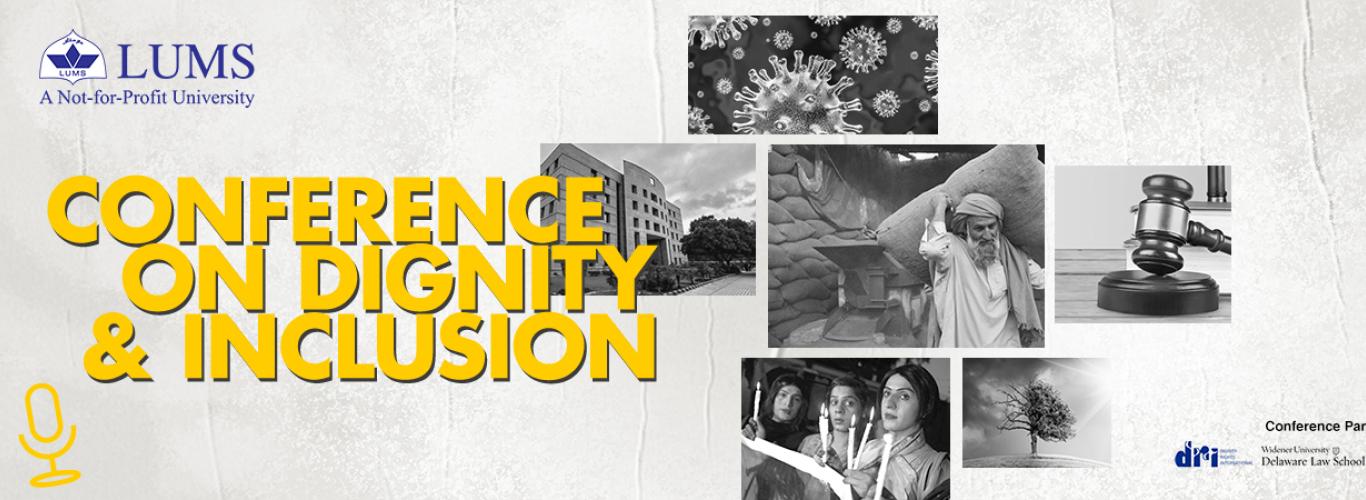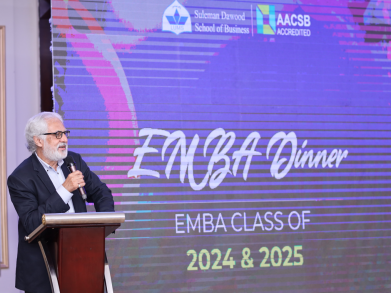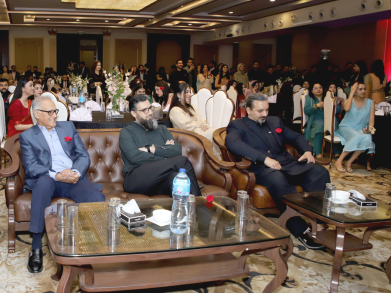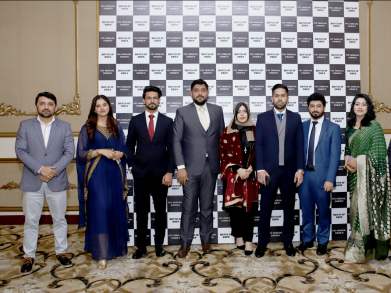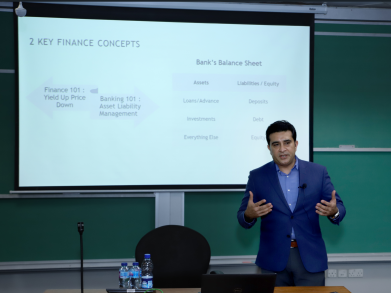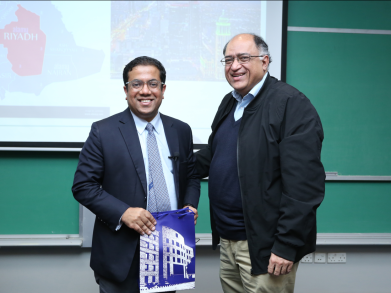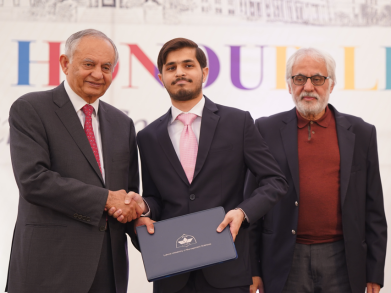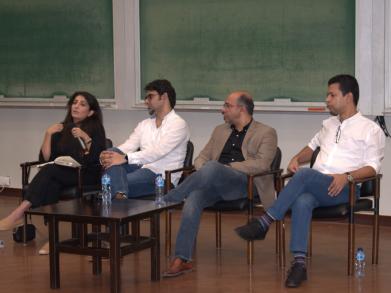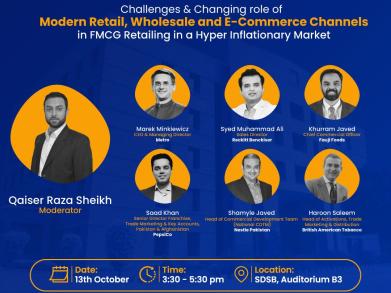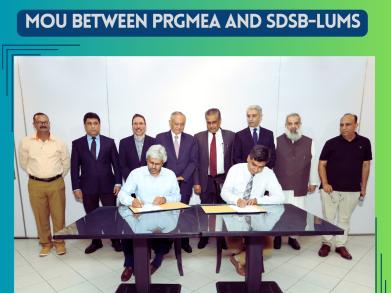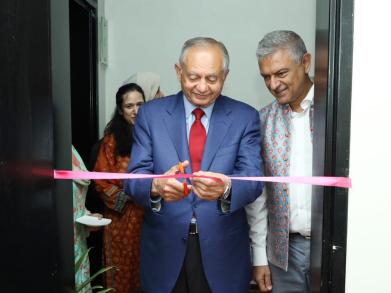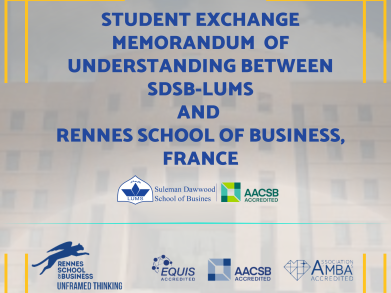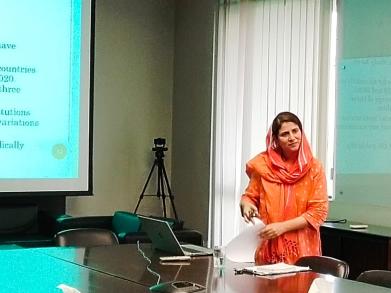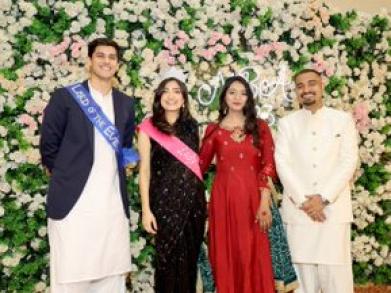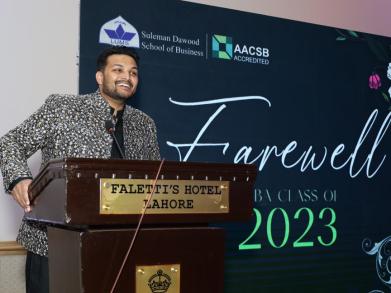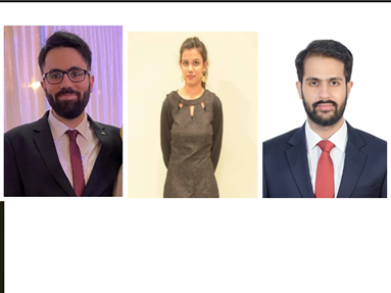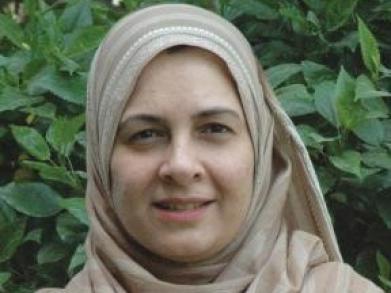LUMS Office of Accessibility and Inclusion Conduct Inaugural Conference on Dignity Rights and Inclusion
The Office of Accessibility & Inclusion (OAI) at LUMS hosted its inaugural two-day virtual conference on ‘Dignity & Inclusion’ from 21st-22nd May 2021. The event was co-sponsored by the Delaware School of Law, Widener University and Dignity Rights International.
The aim of the conference was to highlight and increase awareness of fundamental dignity rights for peoples of all casts, creeds, races, gender, socioeconomic status, and political affiliation. Given the broad scope and nature of the topic, the conference was divided into seven themes, and subsequently seven panel discussions, surrounding human dignity and dignity rights.
Kicking off the conference, Faculty Director, Ms. Angbeen Mirza, stressed on the importance of a discourse on dignity and dignity rights for all peoples at all levels of society. Looking inwards to the LUMS campus, she added that “despite our best efforts towards inclusion, it is important to recognise that we sometimes fall short of our goals, and this is an area where constant revisitation to the drawing board is absolutely necessary”. The conference was then formally inaugurated by Vice Chancellor, LUMS, Dr. Arshad Ahmad, who lauded the efforts of the team at OAI for organising this inaugural conference. He expressed that these conversations were important to move forward for a better future. “I hope this conference will help raise your collective voice as citizens of the world; a world where we see inherent rights being respected at all times irrespective of our politics, of our economics, our inherent biases and all the flaws that we come with.”
Keynote addresses on both days were given by distinguished Professors of Law from the Delaware School of Law, Professor James R. May and Professor Erin Daly.
Dr. May set the tone for the conference as he went through the definition of dignity, its interpretation in international law and in the constitutions of different countries around the world, including Pakistan. Making a case that even though the equitable implementation of dignity rights has myriad of challenges “[it] is worth the commitment.”
Professor Daly commenced the second day by sharing insights and reflections on the concept of dignity in the context of justice, statehood, the measure of law and activism. “The time has passed to simply learn the law and apply it. The time has come to act as if our paradigms have actually shifted, as we are actually taking the inherent and equal dignity of a person in present and future generations seriously.”
Dr. Farhat Haq, Provost LUMS, also addressed the audience on the second day. She stressed upon the need to pay attention to more than just the constitutional and legal aspect of the right to dignity and inclusion. “For me, this right, perhaps, invokes a deeply emotional core of our being, for our desire for respect. Therefore, I think it demands not only for this legal infrastructure we talked about, [but] it also demands daily practices and cultural reflections on things that we do that may take away from the dignity of other human beings.”
Each of the seven panel discussions spanned over the two-day conference provided an in-depth view of dignity and inclusivity under a particular theme, and input from each panelist gave the audience multiple perspectives on the different issues being discussed.
The Conference began with one of the most subscribed panels, on ‘Dignity and Transgender Rights’. Dr. Mohammad Moiz, a transactivist and a medical professional, moderated the session, while the panelists included Dr. Fouzia Saeed, a gender activist and a researcher, Mr. Naveed Qamar, a seasoned politician who presented the Transgender Persons Act in Parliament, and Ms. Bindiya Rana. Ms. Rana, a trans activist and founder and president of Gender Interactive Alliance, passionately shared anecdotes of various injustices faced by her and her community and questioned the gaps between the law and its implementation in society. “A transgender has talent too, can differentiate between the good and bad too. Why are we a stigma for civil society? Why aren’t we allowed to progress? Why aren’t we getting the same resources a man or woman get? We want to exist together with the rest of the country. Education and health are the basic rights for everyone.”
This was followed by the panel discussion on ‘Dignity Rights and Climate Change’, where experts shared their research to show the scale of the ongoing climate crisis, the devastating effect of climate change on communities that depend on natural resources and the need to dismantle existing systems of violence, inequity and consumption. The session was moderated by Professor Erin Daly from the Delaware School of Law, and panelists included the Honorable Justice Mansoor Ali Shah from the Supreme Court of Pakistan, Ms. Farhana Yamin, a climate lawyer, Dr. Sanval Nasim, an environmental economist, Mr. Ahmed Rafay Alam, an environmental lawyer and founding partner of Saleem, Alam and Co, and Ms. Medha Patkar, an activist and the founder of Narmada Bachao Andolan. The gist of the session was well-summarised by Mr. Ahmad Rafay Alam who urged attendees to bring the environment to the forefront of their decision-making and day to day living, “Human beings and nature have been intertwined throughout history. So much of our culture is associated with nature and it is used to form the basis of our stories. Modernity has somehow taken the environment and put it behind us as a backdrop to the story of individual humans being told. The underlying principle should be to somehow bring back nature into the discussion about dignity.”
The first day closed with the panel on Dignity on campus. The session was moderated by Professor John Culhane from the Delaware School of Law, while the panelists included Ms. Felisa Tibbits, an academic and researcher on Human Rights Education from Columbia University, Dr. Sigal Ben-Porath, an academic and a researcher on ‘Free Speech on Campus’ from the University of Pennsylvania, Dr. Ivan Suneel, a psychologist and a trained therapist, from Forman Christian College, and Dr. Rick Halperin, the Director of the Human Rights program at the Southern Methodist University. Each panelist brought a new perspective to the discussion while highlighting a novel concept of dignity rights and campus and agreed that human rights education must become a compulsory part of the curriculum at high school as well as college level. They acknowledged the need to decolonise the world of academia, and that educational institutions are not only flagbearers of imparting knowledge, but also have the responsibility to cultivate a culture of empathy, sympathy, and responsible behavior.
Panels on the second day included one on labour and dignity rights. The session was moderated by Ms. Hiba Akbar, teaching fellow at SAHSOL, LUMS, while the panelists included Dr Hadia Majid, a labor economist, Dr. Umair Javed, a sociologist, Dr. Muhammad Azeem, Assistant Professor of law, Dr. Ammar Ali Jaan, an academic and an activist, Dr. Aasim Sajjad Akhtar, political and development economist, and Ms. Tabitha Spence, a labor activist. The panelists and the moderators had a fruitful discussion surrounding labor organisation and collective political action against injustices, and concluded that there is an urgent need to organise labor movement and laborers for collective action and political recognition against socio-political and economic injustices.
The panel on Dignity and COVID-19 focused on our new ‘world order.’ Like most events this past year and a half, one of the reasons this conference was conducted online was the travel restrictions due to COVID-19. It was a stark reminder that much of the world we exist in today has been heavily impacted by the pandemic and made the panel discussion on ‘Dignity Rights and COVID-19’ pertinent. Dr. Samia Altaf, Professor of Practice in Public Health and Director of Campus Health and Safety at LUMS, explained, “When we say dignity is a value, the issue that comes to my mind is, who defines that? Who has the power to give a definition for the word and to that value? That is an important notion, which has an impact on how services are provided in society and how attitudes are made.” Other panelists included Ms. Anum Malkani, an economic researcher, who elaborated on the importance of digital technologies in tackling pandemics; Dr. Sara Mirza, a pulmonologist from Rush University, who narrated the horrors of the pandemic as a primary healthcare provider; and Dr. Faisal Bari, an economist, who spoke of the impact of the pandemic on women’s income and well-being and how thier dignity is violated during these trying times. The session was moderated by Professor James R. May. The panel unanimously agreed while COVID-19 cases are decreasing globally as vaccines are administered; however, the rich countries are benefiting more from the roll-out than the poor, and the world is yet to witness its long-term impact on peoples’ lives and dignity, particularly the poor. In addition, they also agreed that we must change our social order for a more egalitarian world.
The conference closed with twin and concurrent sessions on Dignity Rights and Access to Justice. One panel focused on access to justice for women. The session was moderated by Dr. Sadaf Aziz, Associate Professor at SAHSOL, and included Ms. Hina Jilani, human rights lawyer and activist, Ms. Zari Zana Abdul-Aziz, an academic and research and Dr. Sarah Suhail, an activist and researcher as panelists.
The underlying theme of the first panel was patriarchy and patriarchal culture that governs the ‘dignities’ and ‘honors’ of men in Pakistan and most Muslim countries, which also affect the lives of women, who are deprived of their fundamental human rights. The panelists also concluded that unlike men, women-powerful or weak-have had to fight for their mere existence.
The second panel focused on the dignity of prisoners. Incarcerated individuals face all sorts of mental and physical torture; their dignity is violated in multiple ways. This session dissected the indignities inflicted upon people in the criminal justice system, especially those who are under trial. The session was moderated by Mr. Saroop Ijaz, a human rights lawyer associated with the Human Rights Watch Pakistan, and panelists included Ms. Sarah Belal, founder of the Justice Project Pakistan, Dr. Kaleem Imam, the Inspector-General Motorway Police, and Ms. Haya Emaan Zahid, director of Legal Aid Society. The panelists, along with the moderator, agreed that there’s a dire need to change Pakistan’s criminal justice system, especially the prison system, which violates the dignity and the privacy of every prisoner, especially death row inmates. Moreover, it was concluded that it costs an exorbitant amount of tax money to fund jails. Hence, we must evaluate the current prosecution and prison system and work.
To make the conference inclusive and accessible for all peoples, OAI had provided live translations from English to Urdu and vice-versa. In addition, as well as sign language interpretation services were provided by ConnectHear. LUMS hopes to make this the first of many such exchanges where people from diverse backgrounds are able to learn from each other and facilitate dialogue on matters of importance in the area of equity and inclusion.
You can view all the sessions on the OAI's Facebook page.

